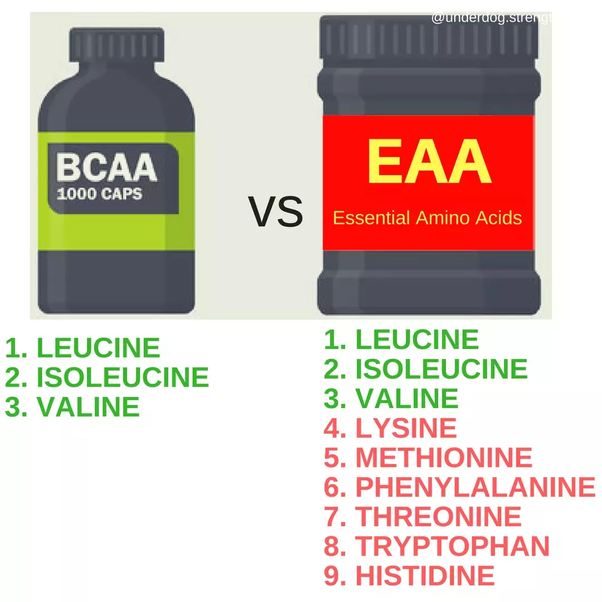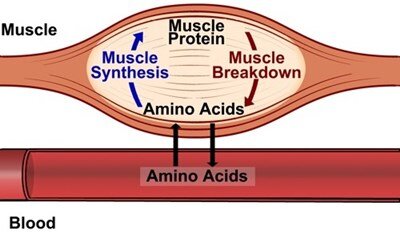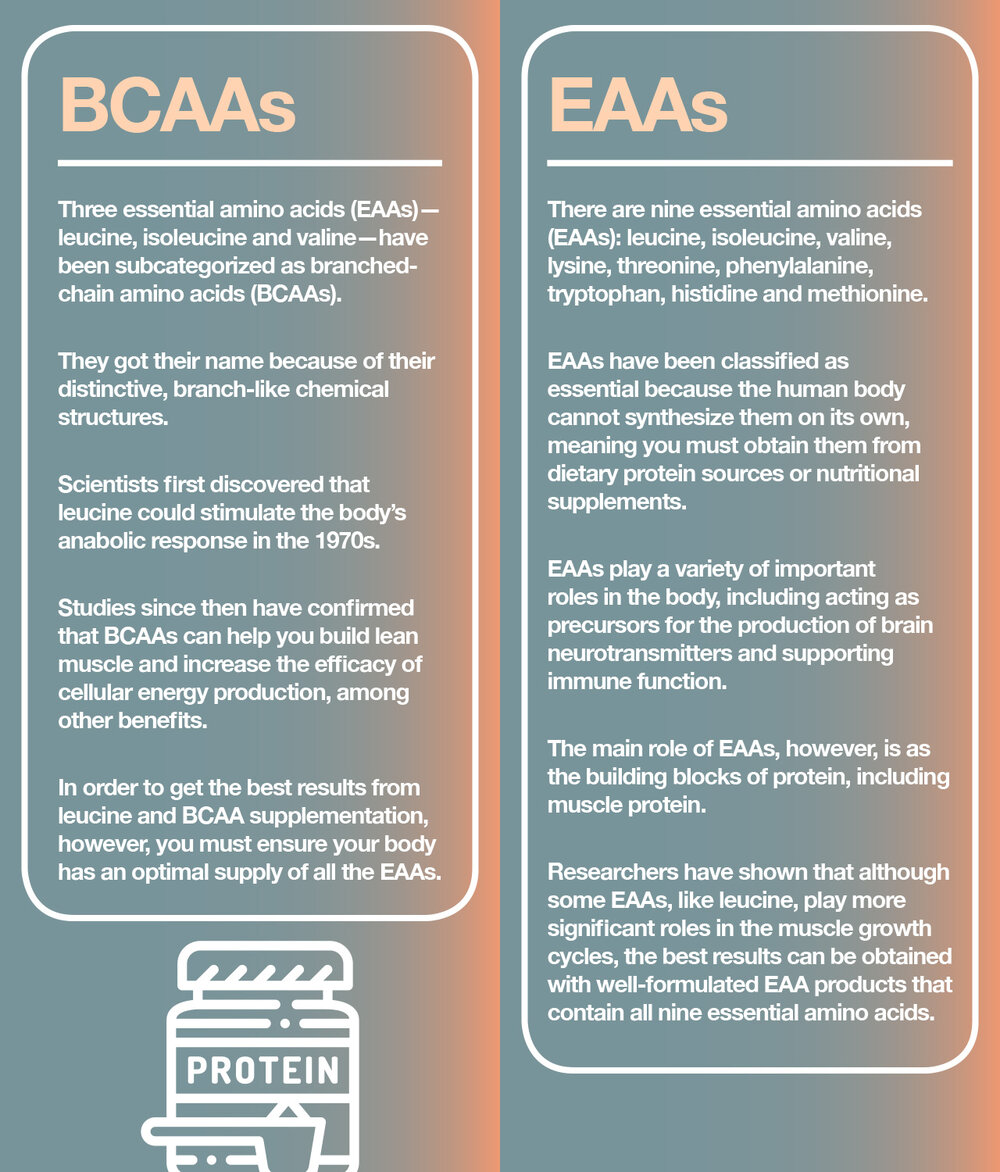Sup Cobracor fam! This has come up frequently with clients and I feel it’s another topic that warrants being addressed.
BCAAs VS EAAs

I won’t assume that if you are here you already know the basics so I’ll give a quick background, or for most, a refresher.
There are 20 amino acids that comprise muscle protein. 9 are considered essential amino acids (EAAs) which can’t be produced by the body in physiologically significant amounts, and therefore are crucial components of eating a balanced diet. The branched-chain amino acids (BCAAs) leucine, isoleucine and valine are three of the nine EAAs; leucine being the most important as it also may play a role as a regulator of intracellular signaling pathways that are involved in the process of protein synthesis.
Muscle protein is in a constant state of turnover, meaning that protein synthesis is occurring continuously to replace protein lost as a consequence of protein breakdown. For synthesis of new muscle protein, all 9 EAAs, along with the 11 non-essential amino acids that can be produced in the body, must be present in adequate amounts.

So what do we really need and which is superior for my money? Do I really need either?
The concept that the BCAAs may have a unique capacity to stimulate muscle protein synthesis was brought forward over 35 years ago from studies of the responses in rats. These studies have little relevance to human responses and not until recently has the public started to catch on to the notion that BCAAs aren’t the king of amino acid supplementation. Heck, it may be doing certain individuals more harm than good according to a few studies like this one from The Journal of the International Society of Sports Nutrition.
“An extensive search of the literature has revealed no studies in human subjects in which the response of muscle protein synthesis to orally-ingested BCAAs alone was quantified, and only two studies in which the effect of intravenously infused BCAAs alone was assessed. Both of these intravenous infusion studies found that BCAAs decreased muscle protein synthesis as well as protein breakdown, meaning a decrease in muscle protein turnover. The catabolic state in which the rate of muscle protein breakdown exceeded the rate of muscle protein synthesis persisted during BCAA infusion. We conclude that the claim that consumption of dietary BCAAs stimulates muscle protein synthesis or produces an anabolic response in human subjects is unwarranted. “[1]
Frontiers in Physiology published a study showing that BCAAs were better than taking absolutely nothing but
“the magnitude of this increased response of myofibrillar muscle protein synthesis was ~50% less than the previously reported myofibrillar-MPS response to a dose of whey protein containing similar amounts of BCAA.”[2]
Furthermore BCAAs compete each other in a sense. Since 1966 we’ve known that the other branched chain aminos may impede leucine’s absorption in the gut. The three branched aminos even compete for the same transporter at various sites[3], so why not just use Leucine right?
When or why should someone use BCAAs then? Eh possibly for endurance, fatigue, and preventing muscle breakdown, but not building muscle.

Since EAA supplements inherently contain the BCAAs, you get the best of both worlds. First, there’s the increased muscular endurance and resistance to muscle protein breakdown that comes with BCAAs. Second, you get a MUCH stronger anabolic response and all of the building blocks necessary to build lean muscle. BCAAs can initiate muscle-protein synthesis, sure, but without the complete profile of EAAs the response is greatly limited.
The key here, is eating enough protein throughout day or possibly even protein shakes instead, for a complete amino profile along with the inherent nutrients of the food. Doing that makes adding aminos the same as adding sand to the beach
At the end of the day, amino acids are a luxury supplement and should be put way behind quality food, adequate sleep, and supplements like a multi-vitamin-fish oil, or a protein powder; for my enhanced people this is secondary to heart, liver, kidney, blood pressure, and blood sugar health supplementation.

[1] Wolfe, RR; “Branched-chain amino acids and muscle protein synthesis in humans: myth or reality?”; J Int Soc Sports Nutr; 14(1):30; 2017; https://jissn.biomedcentral.com/articles/10.1186/s12970-017-0184-9
[2] Jackman SR, Witard OC, Philp A, Wallis GA, Baar K, Tipton KD. Branched-Chain Amino Acid Ingestion Stimulates Muscle Myofibrillar Protein Synthesis following Resistance Exercise in Humans. Frontiers in Physiology. 2017;8:390; https://www.ncbi.nlm.nih.gov/pmc/articles/PMC5461297/
[3] Szmelcman, S., and K. Guggenheim; “Interference between Leucine, Isoleucine and Valine during Intestinal Absorption”; Biochemical Journal; 100.1: 7–11; 1966; https://www.ncbi.nlm.nih.gov/pmc/articles/PMC1265085/
source https://www.cobracor.com/blog/bcaas-or-eaas
source https://cobracor.blogspot.com/2019/10/bcaas-or-eaas.html
No comments:
Post a Comment